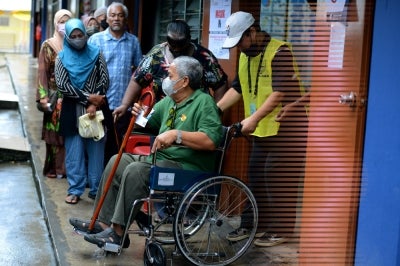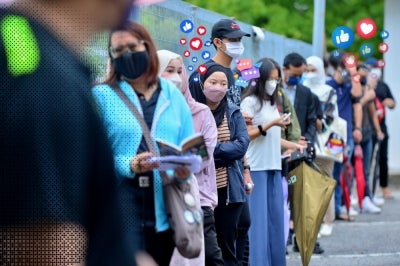Rafizi's warning: PKR support plummets, GE at risk
PKR needs urgent strategy to regain public trust

A recent survey, unveiled by PKR deputy president candidate Rafizi Ramli during the party's HIRUK Tour in Seremban, has delivered a stark warning: PKR is facing a critical support crisis that could jeopardise its hold on power in the next general election.
The study, conducted between March 2023 and April 2025, revealed a dramatic decline in support across key demographics, including Malay, Chinese, Indian and youth voters.
Rafizi's findings, presented to party members in Melaka and Negeri Sembilan, painted a troubling picture.
Malay voter support for PKR has stagnated at a mere 27 per cent, well below the crucial 35 per cent threshold needed to secure vital parliamentary seats.
While support for Perikatan Nasional (PN) has also dipped, a significant 28 per cent of Malay voters remain undecided, a bloc that could swing the election.
The survey also exposed a precipitous drop in support among Chinese and Indian voters.
Chinese support for Pakatan Harapan (PH), including PKR, has plummeted from 63 per cent to 31 per cent, with a majority now expressing disinterest in any party.
Rafizi highlighted the concerning trend of low Chinese voter turnout, citing the recent Sungai Bakap by-election as a prime example.
He warned that this trend could transform mixed-ethnicity constituencies into Malay-majority seats, eroding PH's urban advantage.
Similarly, Indian voter support has crashed from 69 per cent to 31 per cent.
A Generation Shift: Gen Z and Millennials Turning to Pas
Perhaps the most concerning revelation was the shift in younger voters’ preferences. Both Gen Z (18-27) and Millennials (28-44) now trust Pas more than PKR when it comes to handling corruption:
- Gen Z: Pas 29 per cent vs PKR 8 per cent
- Millennials: Pas 26 per cent vs PKR 21 per cent
This shift aligned with broader national trends, where Pas has overtaken PKR as the party most trusted to combat corruption. With corruption now the top issue for voters, surpassing the economy as a concern, PKR’s image has suffered.
PKR's Declining Relevance
Rafizi also acknowledged that PKR has increasingly become a party favoured by older generations—Gen X (45-59) and Boomers (60+).
As younger voters, who will form the majority of the electorate in the next General Election, gravitate towards Pas, PKR risks losing its political relevance.
The party’s once-strong reputation for combating corruption has eroded, with only 18 per cent of voters now dissatisfied with PKR’s economic management, but 31 per cent expressing disappointment over its failure to address corruption effectively.
The Path Forward: Urgent Action Required
Rafizi, known for his data-driven approach, emphasised the urgent need for PKR to develop a clear strategy to regain public trust and reconnect with disillusioned voters.
He warned that ignoring these findings could lead to the party's collapse in the next election.
His message: PKR must act decisively to rebuild its integrity, engage young voters and implement data-driven strategies to remain relevant.
Political analyst Muhammad Afifi Abdul Razak, who penned the analysis, suggested that Rafizi's findings presented a critical juncture for PKR and that the party's future hinges on its ability to respond effectively.
Download Sinar Daily application.Click Here!















